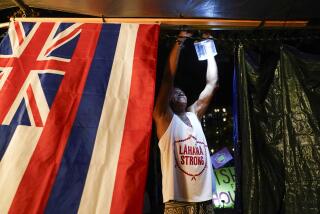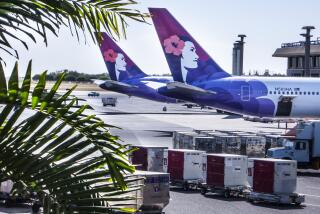Harry Owens of âHawaii Callsâ Dies at 84
Harry Owens, whose âHawaii Callsâ radio broadcasts became a vicarious vacation to those lush tropic isles for millions of Americans during the bleak days of the Depression, died early Friday in Eugene, Ore.
His wife, Helene, said he died at Sacred Heart Hospital and was 84. The Owenses had maintained homes in Eugene and Palm Springs since the veteran conductor-composerâs retirement about 15 years ago.
Owens will be remembered by some as the band leader who organized The Royal Hawaiians orchestra at the hotel of the same name in Waikiki in 1933.
Composed âSweet Leilaniâ
But he will be remembered by nearly all as the composer of âSweet Leilani,â a song he wrote for his daughter the day she was born in 1934. It won an Academy Award for Owens when sung by Bing Crosby in the picture âWaikiki Weddingâ in 1937. More than 20 million recordings of the song have been sold, with Crosbyâs alone accounting for 5 million copies.
Owens was already an established band leader and composer (âLinger Awhileâ) who was fronting a band at Hollywoodâs old Cafe Lafayette, among other places around town.
One evening, for no particular reason, the trumpet-playing leader added the plaintive âAloha Oeâ to the bandâs repertoire. (Owens said later he couldnât even pronounce the songâs title). Soon after, the visiting manager of the Royal Hawaiian Hotel heard him and the song and invited Owens to organize an orchestra at his resort.
He arrived on Waikiki Beach in 1933 and formed Harry Owens and the Royal Hawaiians featuring Hilo Hattie, Alfred Apaka and Al Kealoha Perry.
The group featured primarily drums, guitars and ukuleles. Owens liked to remind people that the ukulele was not indigenous to the islands but had been introduced by the Portuguese.
In 1935 entrepreneur Webley Edwards, inspired by a shortwave transmission he had heard from the islands, produced the first âHawaii Calls,â which was broadcast from the shores of Waikiki Beach each Saturday before live crowds with sounds of the surf accompanying Owensâ music. The oceanâs roar was considered so vital to the programâs authenticity that one sound engineer was stationed at waterâs edge with a microphone.
In those early days the radio transmissions washed in and out much like the Waikiki tide that many felt added to the programâs fey charm.
Owens had adapted some of the traditional Hawaiian songs he had inherited to dance tempo, and with those classics and his own compositions (âTo You Sweetheart, Aloha,â âBlue Shadows and White Gardenias,â âPrincess Poo-poo-ly Has Plenty Papayaâ) he attracted a huge listening audience.
When Owens left the show just before World War II to tour with Hilo Hattie and the band on the Mainland, âHawaii Callsâ and its signature, âas the sun sinks slowly in the west,â was being credited with sparking a tourist interest in those then-remote islands that continues into the Jet Age.
Owens toured with the band during the war and in 1949 launched âThe Harry Owens Showâ on regional television. (Locally, it was seen on Channels 2 and 5).
The program ran for nearly 10 years, and when it went off the air, Owens left music to form a tourism company and then a music publishing firm.
His first wife, Bess, Leilaniâs mother, died in 1946, and two years later he married Helene Cleveland, a newspaper society editor. She survives him, as do Leilani, now Leilani Dobric, and another daughter, Melinda Studer; two sons, Harry Jr. and Tim, and seven grandchildren.
More to Read
The biggest entertainment stories
Get our big stories about Hollywood, film, television, music, arts, culture and more right in your inbox as soon as they publish.
You may occasionally receive promotional content from the Los Angeles Times.










